Hoover's Tax Nemesis
By Colin Twiggs
April 16, 2009 2:00 a.m. ET (4:00 p.m. AET)
These extracts from my trading diary are for educational purposes and should not be interpreted as investment or trading advice. Full terms and conditions can be found at Terms of Use.
Herbert Hoover is one of the most competent administrators, in my opinion, to have ever graced the White House and his reputation as the father of the Great Depression is undeserved. He was, however, the first president to encounter a financial melt-down on the scale of the 1929 collapse and was unprepared for the consequences. His attempts to meet a typical slow-down in the business cycle with accelerated government spending programs and efforts to maintain employment and wage levels proved inadequate to deal with this new threat: a complete loss of faith in the financial system. Having to make up the game plan as he went, and with no real precedent, the result was inevitable.
Hindsight tells us that a federal guarantee of bank deposits may have saved a large number of the eventual 10,000 banks from collapse. And that state-declared bank holidays, in an effort to slow the effect of the run on local banks, merely fuelled the panic. But Hoover's real nemesis was the fall in revenue collection. Rapidly declining private incomes and high default levels meant that state and federal revenue collections shrunk rapidly, curtailing government spending programs and forcing increases in state and federal taxes.
While most governments have long since abandoned the discipline of a balanced budget, and are prepared to go into deficit to maintain spending programs, they should be aware of the pitfalls. Deficits effectively incur debt to be repaid by the next generation in order to rescue the present generation. A common political trick: to enhance the welfare of the current electorate at the expense of someone not old enough to vote. Most voters are aware that this is irresponsible, but condone it on the grounds of necessity. The trap is that the economy may still contract, despite increased government spending. Consumers have been living above their means for almost a generation, fuelled by a massive debt bubble, and will now have to live below their means in order to restore stability — increasing savings and debt repayments.
Collapsing government revenues, as incomes shrink, could cause the deficit to spiral out of control. Federal taxes on corporate income have already fallen by 36 percent (2008 Q4 compared to 2006 Annual, Z1 Flow Of Funds F106), led by a 48 percent fall in the financial sector. Personal taxes fared better, with only a 3 percent drop from their peak. State and local government taxes have barely fallen, largely because of broad based sales taxes. Which reinforces my argument that governments should abandon income taxes in favor of broad-based sales or value-added taxes. But I will save that for another newsletter.
The danger is that governments commit to deficit spending only to find that tax revenues fall further than expected. Attempts to raise taxes in order to keep the deficit under control, as Hoover discovered, reduce both consumption and employment. It does not matter whether you tax the rich or the poor, the result is the same. The only way to avoid this trap is to keep deficit spending to a minimum: aiming for quality rather than quantity. Unfortunately there is little sign of fiscal discipline at present.
A New Bubble
Attempts to rescue consumers from the current credit contraction by creating a new debt bubble are sheer folly. If successful they would lead to an even greater contraction in the next cycle, with disastrous consequences for the entire system.
Economic Indicators
Bank Credit
Bank and consumer credit continue to fall, offering no signs of a recovery.
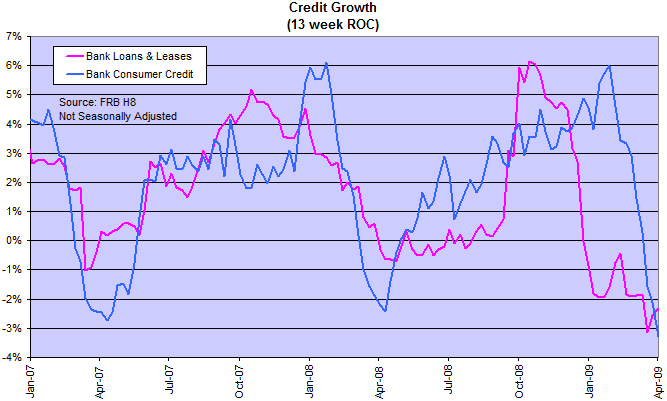
Confidence Levels
Consumer confidence, as measured by the Conference Board, paints a similar picture.
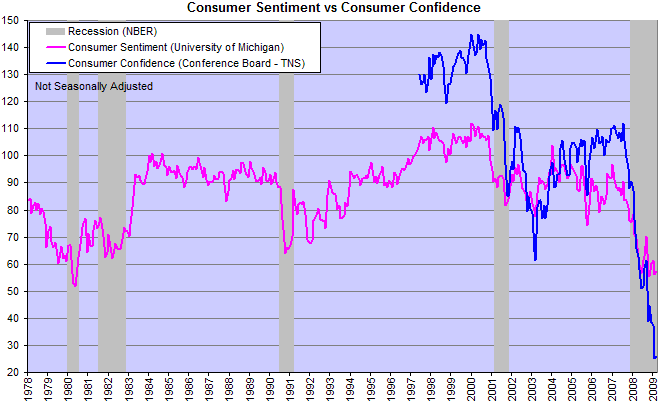
Retail Sales
The drop in monthly retail sales is largely due to the contraction in motor vehicle and gas sales. Falling gas prices are partly responsible for the sharp drop in gas sales, which leveled off in the last quarter. Motor vehicle sales continue to decline, however, with no sign of recovery. We should watch this figure closely: trend reversal would be a strong bull signal for the economy.
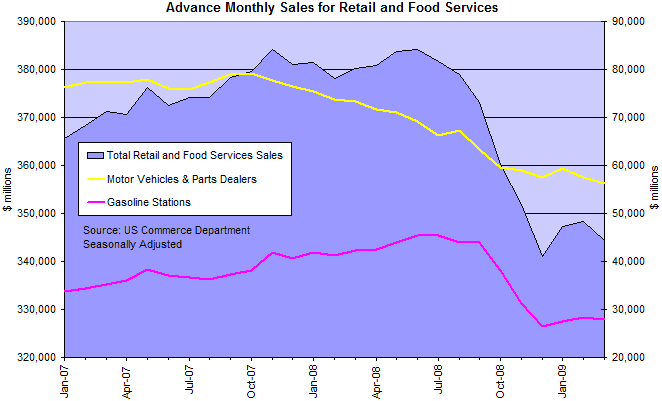
Housing
Fed purchases of mortgage backed securities are driving down mortgage rates, offering hope of a bottom in the housing market. But even the Fed is powerless if employment continues to fall. Buyers will no longer find it easy to obtain a mortgage if they don't have a job.
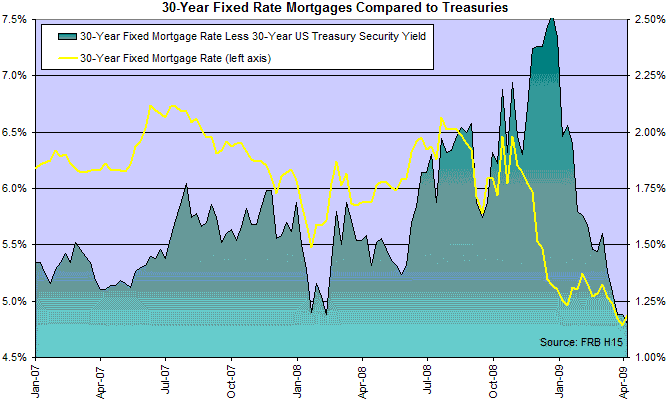
Corporate
The bad news extends to the corporate sector, with bond spreads rising in anticipation of higher defaults.
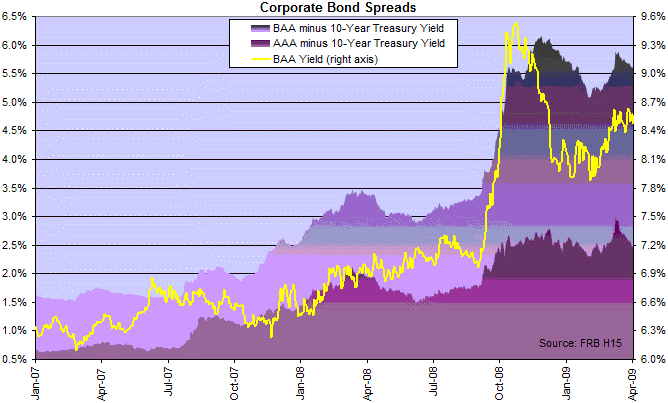
Inflation
The consumer price index crossed into negative territory, largely due to falling gas prices, with core CPI maintaining at around 2 percent. But plummeting producer prices warn of further falls in CPI. Which would be bad news for gold bulls expecting a surge in inflation to lift the gold price.
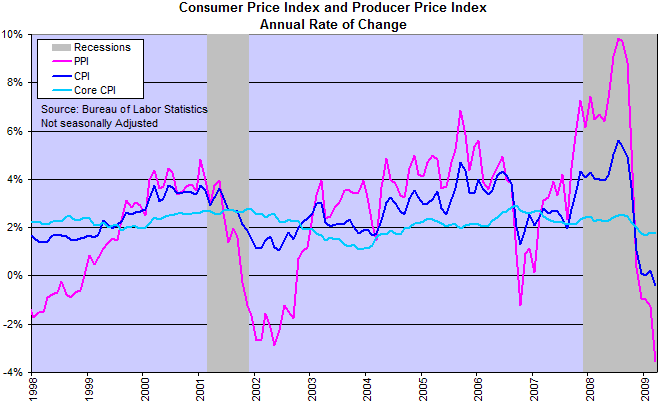
I will tell you my secret if you wish. It is this: I never buy at the bottom and I always sell too soon.
~ Baron Rothschild as quoted in Edwin Lefevre's Reminiscences of a Stock Operator

Author: Colin Twiggs is a former investment banker with almost 40 years of experience in financial markets. He co-founded Incredible Charts and writes the popular Trading Diary and Patient Investor newsletters.
Using a top-down approach, Colin identifies key macro trends in the global economy before evaluating selected opportunities using a combination of fundamental and technical analysis.
Focusing on interest rates and financial market liquidity as primary drivers of the economic cycle, he warned of the 2008/2009 and 2020 bear markets well ahead of actual events.
He founded PVT Capital (AFSL No. 546090) in May 2023, which offers investment strategy and advice to wholesale clients.
